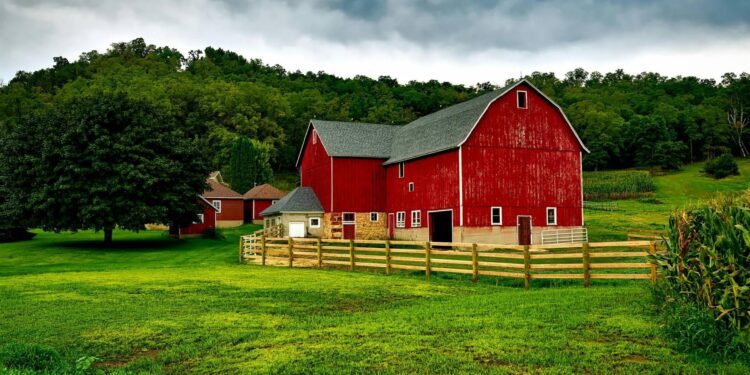For more than a hundred years, Andrew Smith’s family has been operating a cattle farm on Bodmin Moor in Cornwall.
I am deeply worried about the planned modifications to Inheritance Tax for farmers, which will disproportionately affect Northern Ireland.
I had a discussion with the Secretary of State for NI today and urged the UK government to reconsider the plans that are instilling significant concern and fear.https://t.co/gPNc1MW1fh
— Andrew Muir MLA (@AndrewMuirNI) November 4, 2024
Now 56, Smith manages the farm alongside his three sons, raising approximately 2,000 sheep and 30 to 40 cows annually, yet he reports making “no profit.” He views the changes to inheritance tax rules proposed by Chancellor Rachel Reeves as a serious betrayal of the farming community. Last Wednesday, Reeves revealed that, starting in April 2026, farms and other business properties previously inherited tax-exempt will now be subject to inheritance tax.
Inheritors will need to pay 20% on values surpassing £1 million, which is half the standard inheritance tax rate of 40%. “The boys have been part of the business with me since they finished school,” Smith states.
You Reap What You Sow: my SKETCH on a government that comprehensively understands farmers’ worries. https://t.co/kmFgRvU0BF
— Robert Hutton (@RobDotHutton) November 4, 2024
“They have been raised to take care of livestock in the moors, which presents a very challenging environment for making a living.
Meanwhile, in other news…..
I haven’t seen despair like this in rural areas since the foot and mouth crisis, says ROBERT HARDMAN
via https://t.co/9rJssgGcog https://t.co/bYu9FTSoLV— Robert Hardman (@hardmanr) November 4, 2024
They anticipated assuming control from me, but this represents the final straw for family-run farms.”
Insightful article in @Telegraph on the Budget’s crushing impact on family businesses, featuring quotes from @MalvernianKarl of @CPSThinkTank https://t.co/k3Hj5IWhGl
— Robert Colvile (@rcolvile) November 2, 2024
Smith believes that the new tax regulations overlook the reality that UK family farms are typically asset-rich but cash-poor. If my farm is appraised at £5 million, my sons won’t be able to settle an £800,000 inheritance tax bill. They will simply need to sell off part of the land upon my passing.
Consequently, the farm will become unmanageable.”
Jonathan Bell’s family has been involved in farming since at least his great-grandfather’s time. In 2018, he began co-managing the 250-acre farm with his wife and parents. “Rachel Reeves has ruined our farming operation and our cold-pressed rapeseed oil business,” says Bell, 55.
Bell estimates that their family could face an inheritance tax bill of £400,000.
Inheritance tax burdens family farms
“On a business with a profit of £30,000, I could never manage a debt of that size,” he says.
“We would need to divest part of the farm, making our situation even more precarious, which raises the “very unfortunate” prospect of having to abandon farming entirely. In the East Midlands, Andrew Brown owns around 100 acres but primarily works as a tenant farmer producing wheat. He exhibits mixed feelings about Reeves’s new tax rules.
“I see the intention behind it as ultimately positive because some extremely wealthy landowners aren’t farmers; they simply purchase land to exploit IHT regulations. So, if this deters wealthy individuals from acquiring farmland to evade taxes, that’s a step in the right direction, as these people can afford the tax regardless,” he states. “I understand the rationale but believe there were better methods to accomplish it.
The threshold is excessively low, impacting many individuals, and it should be implemented gradually—5%, for example, on farm values up to £5 million, increasing to 10% up to £10 million, and so forth, with a maximum inheritance tax rate of 50% for farms worth over £50 million. This would have been a more equitable approach.
Gerallt Lloyd recalls his childhood days on his parents’ dairy, sheep, and beef farm near Aberystwyth, where he would pour fresh cow’s milk for himself. Now, decades later, Lloyd, at 47, continues to work with his 77-year-old father on the same land in west Wales, with aspirations of one day transferring it to his own children, aged 17 and 14.
He owns 120 acres but rents an additional 150 to maintain the farm’s viability.
Lloyd is concerned that the Chancellor’s move to alter agricultural property relief may prevent his children from inheriting the farm. “It feels dreadful,” Lloyd mentions, estimating a tax burden of about £100,000 when he eventually takes over from his father. “This could mark the end for many family farms.”
The National Farmers’ Union has described the proposals as “catastrophic” for the sector.
The government has asserted that the alterations will only impact approximately 2,000 estates annually.


